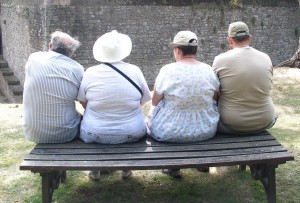 Take a good look around you – at your family and friends. Do the bulk of them seem to be overflowing their chairs?
Take a good look around you – at your family and friends. Do the bulk of them seem to be overflowing their chairs?
A study published in the New England Journal of Medicine (N Engl J Med 2007;357:370-9) seems to indicate that if you’re struggling with your weight, there is a good chance that your friends and family are, too.
Using data collected over 22 years from a “densely interconnected social network” of 12,067 people who took part in the Framingham Heart Study, the researchers found identifiable clusters of obese people, determined by a body mass index ≥30, present in the study’s network at all times. The clusters and the risk of obesity extended to three degrees of separation.
Here’s what they found:
- A person’s chance of becoming obese increases by 57% if he or she has a friend who becomes obese. In a mutual friendship, the person’s risk of obesity increases by 171% if the friend becomes obese.
- Among pairs of adult siblings, if one sibling becomes obese the chance that the other becoming obese increases by 40%. This is more prevalent among siblings of the same sex (55%) than among siblings of the opposite sex (27%). Among brothers, the chance of becoming obese increases by 44% if a brother becomes obese, and among sisters there’s a 67% increased risk if a sister becomes obese. Obesity in a sibling of the opposite sex doesn’t seem to affect the obesity risk of the other one.
- Among married couples, when one spouse is obese the other is 37% more likely to become obese. Husbands and wives appear to affect each other similarly (44% and 37%, respectively).
- Neighbors in the immediate geographic location don’t seem to have an effect on a person’s obesity.
- Pairs of friends and siblings of the same sex seem to have more influence on the weight gain of each other than pairs of friends and siblings of the opposite sex. In same sex friendships, the probability of obesity in one person increases by 71% if the friend becomes obese. For friends of the opposite sex there’s no significant association. In same sex friendships, a man has a 100% increased chance of becoming obese if his male friend becomes obese. For female friends, the spread of obesity is a non-statistically significant 38%.
As the researchers conclude, “obesity appears to spread through social ties.” Makes you think, doesn’t it?

Ouch! The thing to do is to enroll the people you care most about in fighting this, not in mutual avoidance or indulgence. PLEASE blog about talking to partners/sisters about getting on top of these statistics and risks.
Thanks, Elatia. What an absolutely great suggestion for a blog post.